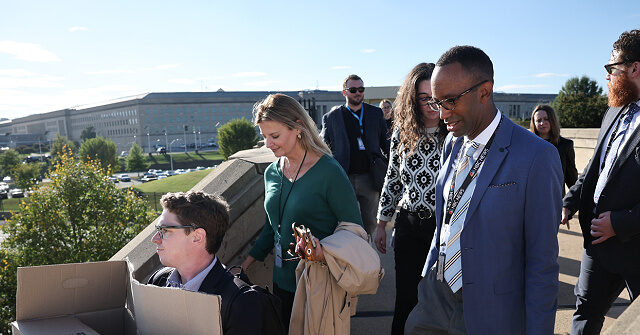Share this @internewscast.com
The deadline set by the Pentagon for journalists to agree to its new press access guidelines has come and gone, with most major media outlets opting to relinquish their credentials rather than comply with the revised policy. On Wednesday, reporters from numerous prominent organizations were observed departing the Pentagon as the newly implemented rules took effect.
The Department of War’s updated press access policy, which required journalists to acknowledge an understanding of access and information-gathering regulations by Tuesday, saw non-compliant reporters clearing out their Pentagon offices by the following morning.
“Today, the Defense Department confiscated the badges of the Pentagon reporters from virtually every major media organization in America. It did this because reporters would not sign onto a new media policy over its implicit threat of criminalizing national security reporting and exposing those who sign it to potential prosecution,” the Pentagon Press Association wrote.
Pentagon spokesperson Sean Parnell addressed the controversy on Monday, stating, “The policy merely requests acknowledgment, not agreement. The resulting backlash, with reporters claiming victimhood online, is unwarranted. We stand firm on our policy as it prioritizes our troops and national security.”
Secretary of War Pete Hegseth said, “You would think that the Pentagon press corps, of all press corps, would be front and center across the board on wanting to give credit to the President for forging this kind of peace, and instead, what they want to talk about is a policy about them.”
Parnell further elaborated, suggesting that the policy might align with protocols at the White House and other military sites, where press members wear identifiable badges and have restricted access. “Previously, the press could access almost any area within the Pentagon, arguably the most secure facility globally,” he remarked.
He continued, “By agreeing to the credentialing, journalists commit to not encouraging soldiers to unlawfully disclose classified information. It’s common sense aimed at safeguarding national security, and we take pride in this measure.”
White House Director of Communications Steven Cheung posted on X that “a few reporters on this wall have privately said they were bullied into participating in the walkout when they actually wanted to stay. They were physically confronted and threatened with retaliation if they didn’t join the protest.”
This development follows major media institutions, including The Washington Post, The New York Times, Reuters, The Atlantic, CNN, and NPR, announcing their refusal to sign the updated access agreement earlier this week. Concerns were raised that the new rules might hinder journalistic reporting and obscure the critical balance between national security and public accountability.
The policy, finalized in September, requires credentialed journalists to sign an “in-brief” form acknowledging information security procedures, escort requirements, and limits on movement within the Pentagon. The Department of War maintains that the rules do not restrict reporting activities or require preapproval of coverage, but journalists argue that the language could expose them to potential retaliation or prosecution for pursuing unauthorized information.

















